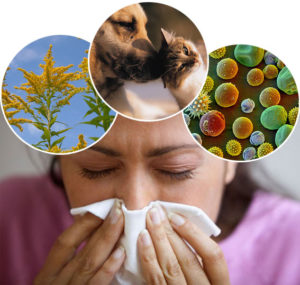 For those who suffer from seasonal allergies, springtime can be a mixed blessing. The warm weather, the flowers, versus the allergy symptoms: runny nose, sneezing, itchy eyes, headaches, fatigue, and difficulty breathing. Left untreated, allergies can lead to sinus infections, feeling groggy, headaches, depression, and in serious cases, allergies can be fatal.
For those who suffer from seasonal allergies, springtime can be a mixed blessing. The warm weather, the flowers, versus the allergy symptoms: runny nose, sneezing, itchy eyes, headaches, fatigue, and difficulty breathing. Left untreated, allergies can lead to sinus infections, feeling groggy, headaches, depression, and in serious cases, allergies can be fatal.
Allergy medications temporarily alleviate these symptoms, while acupuncture addresses the underlying imbalance that’s causing the symptoms in the first place.
An allergen enters the body through the skin or is inhaled. The immune system identifies the substance as potentially dangerous and creates antibodies to attack it. The IgE antibodies in turn affect mast cells throughout the body and cause the release of histamines.
The body produces too much histamine when it has an allergic reaction. An allergic reaction is an overreaction of the immune system to certain substances that normally do not affect most people. This heightened immune response, which causes histamine to be released leads to the allergy symptoms, such as sneezing, itchy throat, and itchy watery eyes.
With acupuncture, seasonal allergies are not isolated to the histamine response. Acupuncture looks at allergies as a general disruption of a person’s defensive mechanisms.
Instead of accepting the over reactive immune response and suppressing it with medication (antihistamines), acupuncturists look at why the person’s immunity is compromised.
During a treatment, acupuncture points are selected for healing the symptoms and bolstering the underlying imbalance. Depending on the specific symptoms, many additional points are also used.
The systems that are most commonly involved in chronic allergies are the lung, kidney and spleen. Treating the underlying imbalance as well as the symptoms helps to optimize immune function and prevent future allergic reactions.
Seasonal allergies are something many people have come to accept as an inevitable part of springtime, a trade off of sorts for the warm weather. It doesn’t have to be this way. Acupuncture can relieve and prevent seasonal allergies, without negative side effects.



